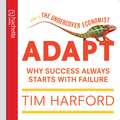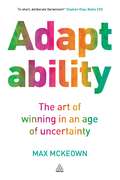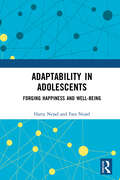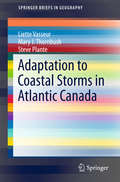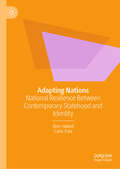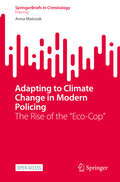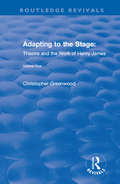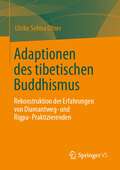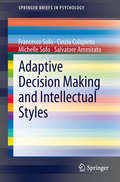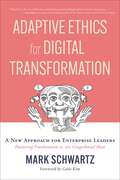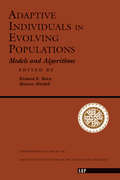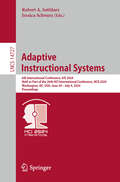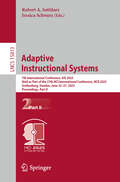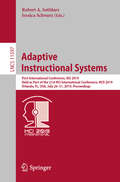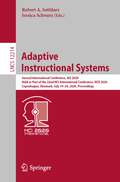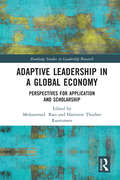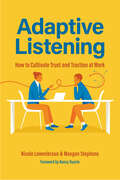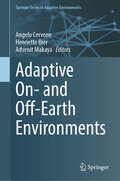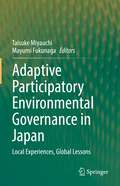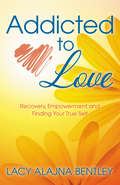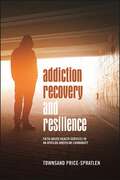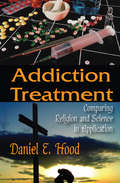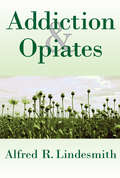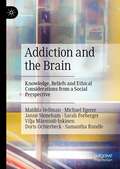- Table View
- List View
Adapt: Why Success Always Starts with Failure
by Tim HarfordEverything we know about solving the world's problems is wrong. Out: Plans, experts and above all, leaders. In: Adapting - improvise rather than plan; fail, learn, and try againIn this groundbreaking new book, Tim Harford shows how the world's most complex and important problems - including terrorism, climate change, poverty, innovation, and the financial crisis - can only be solved from the bottom up by rapid experimenting and adapting.From a spaceport in the Mojave Desert to the street battles of Iraq, from a blazing offshore drilling rig to everyday decisions in our business and personal lives, this is a handbook for surviving - and prospering - in our complex and ever-shifting world.
Adaptability
by Max MckeownAll success is successful adaptation. All failure is a failure to adapt. Adaptability is about the powerful difference between adapting to cope and adapting to win. Fascinating real-world examples from business, government, and sport, military and wider society bring the rules of adaptability to life. From the world's most innovation corporations to street-level creativity emerging from the slums. From McDonalds to Sony, from post-war Iraq to the revolutions of the Arab Spring, from the bustling markets of Hong Kong to the rubber marked circuit of the Monte Carlo Rally. With insightful rules, Max Mckeown shows you how to increase the adaptability of your organization to create winning positions. Human history is a story of competition to adapt between groups and individuals. It has never been more important to understand how to think better and adapt.
Adaptability in Adolescents: Forging Happiness and Well-Being
by Harry Nejad Fara NejadThis book discusses a newly developed concept of adaptability capacity and development as an extension of Charles Darwin’s work on adaptability. It looks at how the human mind uses adaptability resources to deal with life-changing, challenging, and varying circumstances and conditions. The volume presents an integrative process model that assesses the roles of socio-demographic and ability covariates, personality, and other dispositional presage factors in predicting psychological well-being outcomes, such as life satisfaction, happiness, and self-esteem. While exploring the concept of adaptability capacity, the volume focuses on making children and adolescents mentally, emotionally, and behaviorally adaptable. It discusses general and domain-specific constructs relevant to phenomena such as self-regulation, resilience, buoyancy, and coping mechanisms. The book focuses on the development and utilization of treatments to assist individuals in becoming positively adaptable and achieve a higher degree of positive well-being and self-actualization. An important contribution, this book will be of interest to students, researchers and teachers of psychology, educational psychology, and social work. It will also be helpful for academicians, mental health professionals, social workers, psychiatrists, counsellors, and those working in related areas.
Adaptation to Coastal Storms in Atlantic Canada (SpringerBriefs in Geography)
by Mary J. Thornbush Liette Vasseur Steve PlanteThis Briefs is based on an analysis that was performed on the 2010 winter storms that caused considerable damage to coastal communities in Atlantic Canada. The hazards that occurred were associated with storm surge, coastal erosion, and flooding. The analysis covered a large multi-site longitudinal project, where a participatory action research (PAR) approach was used to understand how people in nine coastal communities perceive and experience extreme weather events and to enhance their capacity to adapt and improve their resilience. This Briefs exposes the outcome of two series of interviews and activities that were conducted during the project, as well as the lessons learned, and general elements that should be considered when researchers collaborate with communities to define adaptation and resilience strategies. It makes an important contribution to the application of PAR as an integrated (social-ecological) approach to resilience and how such an approach [. . . ] can be adapted also to other communities.
Adapting Nations: National Resilience Between Contemporary Statehood and Identity
by Carlo Pala Alon HelledNations adapt. Nations are resilient both within and outside the boundaries of statehood. Yet scholarship tends to downplay nationhood, as it focuses on the polity. As a consequence, the investigation of modern societies, though usually articulated around the nation-state model, falls into state-centrism, whilst neglecting the other side of the coin. This book initiates an interdisciplinary debate that encourages research in a field that has largely been overlooked in European social and political sciences. The analysis, offered by the authors, reinstates the concept of the 'nation' beyond the traditional, and somewhat dichotomous, schools of thought, hence neither judging the nation as a mere invention nor as a deterministic product of history. The book provides those interested in nationalism with new approaches to exploring national identity and its connection to statehood. By using concepts inspired by political science and sociology, namely habitus, survival unit, polity, hysteresis, and so forth, the different chapters of the volume revitalise the inquiry of the dimensions and features in which the nation and the identification they engender become tools of adaptation in relation to the transformative reality of our own contemporaneity. The authors thus contextualise the latter via the mid-range concept of national resilience at both meso- and macro-levels.
Adapting to Climate Change in Modern Policing: The Rise of the "Eco-Cop" (SpringerBriefs in Criminology)
by Anna MatczakThis open access brief explores the profoundly accelerating impact of climate change on law enforcement globally. Drawing on the concept of climatisation, it examines how, on one hand, rising temperatures, extreme weather events, resource scarcity, and sustainability transitions pose new challenges for the evolving role of law enforcement in a changing climate. On the other, these developments also present opportunities to adapt and transform the ways the police do policing. This book builds on the author&’s earlier research into the impact of climate change on police work. It combines interdisciplinary research and 23 expert interviews to systematize current knowledge in the field. The aim is to provide a comprehensive understanding of how climate change intersects with policing at societal, organizational, and individual levels. This volume is ideal for policymakers, practitioners, and researchers working at the intersection of climate change and policing.
Adapting to the Stage: Theatre and the Work of Henry James
by Chris GreenwoodThis title was first published in 2000: The American novelist and playwright, Henry James, was drawn to the theatre and the shifting conventions of drama throughout his writing career. This study demonstrates that from the 1890s onwards James concentrated on adapting his novels and stories to and from the stage, and increasingly employed metaphors that spoke of novel-writing in terms of playwriting. Christopher Greenwood argues that these metaphors helped James to conceive himself as an artist who composed characters dramatically and visually, and in doing so sets his novels significantly apart from those of his contemporaries. In the introduction to the first part of the book, Greenwood examines James's career within the context of contemporary European and North American theatre, providing an appraisal of what James gained from contemporary theatre, his position in that milieu, and what he brought to it. Part 2 of the book focuses on two novels: "The Other House" and "The Spoils of Poynton", both of which illustrate the ways in which James used the mechanism of contemporary theatre to communicate a character's personality. Discussion of these two works is used to throw light on similar concerns that develop in James's later writing.
Adaptionen des tibetischen Buddhismus: Rekonstruktion der Erfahrungen von Diamantweg- und Rigpa-Praktizierenden
by Ulrike Selma OfnerWährend hierzulande die Kirchen immer geringeren Zuspruch erhalten, steigt das Interesse am Buddhismus. Darin drückt sich ein fortbestehendes Bedürfnis nach Spiritualität, einer Heilslehre und existentieller Tiefe aus. Tibetischer Buddhismus deckt zudem magisch-mystische Sehnsüchte. Dass dabei die um Vereinbarkeit mit westlicher Lebensweise bemühten Diamantweg- und Rigpa-Schulen die weitaus größte Anhängerschaft vorweisen, mag kein Zufall sein. Der hier gewählte methodologische Zugang gewährt intime Einblicke in Konversions- und Bleibemotive, den Praxisalltag sowie Veränderungen der Selbst- und Weltverhältnisse.
Adaptive Decision Making and Intellectual Styles (SpringerBriefs in Psychology #13)
by Salvatore Ammirato Francesco Sofo Cinzia Colapinto Michelle SofoThis exciting publication provides the reader with a theoretical and practical approach to adaptive decision making, based on an appreciation of cognitive styles, in a cross-cultural context. The aim of this Brief is to describe the role of thinking-through different options as part of the decision-making process. Since cognitive style influences decision behavior, the book will first examine thinking styles, which involve both cognitive and emotive elements, as habits or preferences that shape and empower one's cognition and emotion. The information contained in this Brief will be a useful resource to both researchers studying decision making as well as to instructors in the higher education sector and to human resource development practitioners, especially those working in international, multi-cultural companies.
Adaptive Ethics for Digital Transformation: A New Approach for Enterprise Leaders (Featuring Frankenstein vs. the Gingerbread Man)
by Mark SchwartzDigital transformation doesn't just raise ethical issues, it—in itself—is an ethical shift.Business leaders today are struggling to manage conflicting imperatives, those of the emerging digital world and those of the bureaucratic world of the past. The act of digital transformation requires a deep change in the moral outlook and ethical assumptions of a business. But how do we get there?Enterprise strategist and author Mark Schwartz shows how we need to learn to think differently about relationships with customers and employees. That the ethics of digital transformation is a matter of cultivating and applying virtues rather than applying rules. Ethics is not just a matter of refraining from doing bad things. It's a matter of building the world we want, and it's the job of company executives.Featuring a chapter on bullshit, a handy chart of excuses for bad behavior, and Schwartz's typically paradoxical blend of deep insight and pasta jokes, this book guides business leaders as they struggle to adapt their bureaucratic framework of ethics to the emerging landscape of the digital world. By the end of the book, business leaders will rethink what it takes to be an ethical organization.
Adaptive Individuals In Evolving Populations: Models And Algorithms
by Richard K. BelewThis book is out of a workshop organized to address questions like these. The meeting was sponsored by the Santa Fe Institute and held at Sol y Sam- bra in Santa Fe, New Mexico, during July, 1993. It brought together a group of about 20 scientists from the disciplines of biology, psychology, and computer science, all studying interactions between the evolution of populations and individuals’ adaptations in those populations, and all of whom make some use of computational tools in their work.
Adaptive Instructional Systems: 6th International Conference, AIS 2024, Held as Part of the 26th HCI International Conference, HCII 2024, Washington, DC, USA, June 29–July 4, 2024, Proceedings (Lecture Notes in Computer Science #14727)
by Jessica Schwarz Robert A. SottilareThis book constitutes the refereed proceedings of 6th International Conference on Adaptive Instructional Systems, AIS 2024, held as part of the 26th International Conference, HCI International 2024, which took place in Washington, DC, USA, during June 29-July 4, 2024. The total of 1271 papers and 309 posters included in the HCII 2024 proceedings was carefully reviewed and selected from 5108 submissions. The HCII-AIS 2024 contributions have been organized in the following topical sections: Designing and developing adaptive instructional systems; adaptive learning experiences; AI in adaptive learning.
Adaptive Instructional Systems: 7th International Conference, AIS 2025, Held as Part of the 27th HCI International Conference, HCII 2025, Gothenburg, Sweden, June 22–27, 2025, Proceedings, Part I (Lecture Notes in Computer Science #15812)
by Jessica Schwarz Robert A. SottilareThe two-volume set LNCS 15812-15813 constitutes the thoroughly refereed proceedings of the 7th International Conference on Adaptive Instructional Systems, AIS 2025, held as part of the 27th HCI International Conference on Human-Computer Interaction, HCII 2025, which took place in Gothenburg, Sweden, in June 2025. The total of 1430 papers and 355 posters included in the HCII 2025 proceedings was carefully reviewed and selected from 7972 submissions. The two volumes cover topics as follows: Part I: Adaptive Training and Education; Cognitive Modeling of Adaptive Instructional Systems; Part II: Adaptive and Personalized Learning; Emerging Technologies in Adaptive Instruction.
Adaptive Instructional Systems: 7th International Conference, AIS 2025, Held as Part of the 27th HCI International Conference, HCII 2025, Gothenburg, Sweden, June 22–27, 2025, Proceedings, Part II (Lecture Notes in Computer Science #15813)
by Jessica Schwarz Robert A. SottilareThe two-volume set LNCS 15812-15813 constitutes the thoroughly refereed proceedings of the 7th International Conference on Adaptive Instructional Systems, AIS 2025, held as part of the 27th HCI International Conference on Human-Computer Interaction, HCII 2025, which took place in Gothenburg, Sweden, in June 2025. The total of 1430 papers and 355 posters included in the HCII 2025 proceedings was carefully reviewed and selected from 7972 submissions. The two volumes cover topics as follows: Part I: Adaptive Training and Education; Cognitive Modeling of Adaptive Instructional Systems; Part II: Adaptive and Personalized Learning; Emerging Technologies in Adaptive Instruction.
Adaptive Instructional Systems: First International Conference, AIS 2019, Held as Part of the 21st HCI International Conference, HCII 2019, Orlando, FL, USA, July 26–31, 2019, Proceedings (Lecture Notes in Computer Science #11597)
by Jessica Schwarz Robert A. SottilareThis book constitutes the refereed proceedings of the First International Conference on Adaptive Instructional Systems, AIS 2019, held in July 2019 as part of HCI International 2019 in Orlando, FL, USA. HCII 2019 received a total of 5029 submissions, of which 1275 papers and 209 posters were accepted for publication after a careful reviewing process. The 50 papers presented in this volume are organized in topical sections named: Adaptive Instruction Design and Authoring, Interoperability and Standardization in Adaptive Instructional Systems, Instructional Theories in Adaptive Instruction, Learner Assessment and Modelling, AI in Adaptive Instructional Systems, Conversational Tutors.
Adaptive Instructional Systems: Second International Conference, AIS 2020, Held as Part of the 22nd HCI International Conference, HCII 2020, Copenhagen, Denmark, July 19–24, 2020, Proceedings (Lecture Notes in Computer Science #12214)
by Jessica Schwarz Robert A. SottilareThis volume constitutes the refereed proceedings of the Second International Conference on Adaptive Instructional Systems, AIS 2020, which was due to be held in July 2020 as part of HCI International 2020 in Copenhagen, Denmark. The conference was held virtually due to the COVID-19 pandemic.A total of 1439 papers and 238 posters have been accepted for publication in the HCII 2020 proceedings from a total of 6326 submissions. The 41 papers presented in this volume were organized in topical sections as follows: designing and developing adaptive instructional systems; learner modelling and methods of adaptation; evaluating the effectiveness of adaptive instructional systems.Chapter "Exploring Video Engagement in an Intelligent Tutoring System" is available open access under a Creative Commons Attribution 4.0 International License via link.springer.com.
Adaptive Leadership in a Global Economy: Perspectives for Application and Scholarship (Routledge Studies in Leadership Research)
by Mohammed RaeiWith the entire world experiencing the global pandemic and its aftermath, VUCA (Volatile, Uncertain, Complex, and Ambiguous) conditions have never been more extreme and the need for adaptive leadership never more urgent. But how is adaptive leadership applied outside Western cultures? How can it be taught through leadership development programs? Which tools enhance its practice and its teaching? How does adaptive leadership relate to other key theories and practices? This volume answers these questions and more as it illustrates how adaptive leadership practices address some of the world’s most pressing challenges-political and cultural division, remote work, crisis management-across a variety of sectors. Adaptive leadership has been explained as a key leadership approach for dealing with adaptive, as distinguished from technical or predictable, problems, especially prevalent in complex environments. However, adaptive leadership scholarship has suffered from a lack of conceptual clarity and casual application of its core concepts. It remains solidly Western in its prescriptions. This book will expand readers’ understanding of adaptive leadership and its potential to solve local and global adaptive challenges and will explore its relevance and application to cultures outside the United States. Aiming to increase conceptual clarity about adaptive leadership to enhance future scholarship and application and illustrate novel approaches and perspectives, this book will be of interest to researchers, academics, practitioners, and students in the fields of leadership, strategy, and organizational studies.
Adaptive Listening: How to Cultivate Trust and Traction at Work
by Nicole Lowenbraun Maegan StephensImprove the way you and your teams communicate up, down, across, internally, and externally by implementing a new model for listening in the workplace.Adaptive Listening helps you up-level the under-trained side of communication amidst the realities of a hectic workday. Researched and tested exclusively in the work setting, Adaptive Listening moves you beyond active listening, embracing easy-to-remember techniques that strengthen relationships and get work done more effectively. Aspiring, emerging, and established leaders can build more awareness about their own listening style and the impact it has on their workday. Only then can they adapt the way they listen to meet the goals and needs of direct reports, peers, managers, customers, and stakeholders, all while contributing to a positive workplace culture.Inside learn:How to leverage the strengths and avoid the pitfalls of your listening style by recognizing how you prefer to process and respond to informationHow to break away from ineffective listening and step into Adaptive Listening to meet the goals and needs of the person speaking How to reduce mistrust, misalignment, and miscommunication by being more mindful of the barriers that prevent you from using empathetic communicationHow to cue other listeners to listen in the way you want and needIf you enjoyed You’re Not Listening, Just Listen, Listen Like You Mean It, Power Listening, Nonviolent Communication, or Crucial Conversations, you’ll love Adaptive Listening.
Adaptive On- and Off-Earth Environments (Springer Series in Adaptive Environments)
by Henriette Bier Angelo Cervone Advenit MakayaThis volume investigates the challenges and opportunities for designing, manufacturing and operating off-Earth infrastructures in order to establish adaptive human habitats. The adaptive aspects are considered with respect to the development of adequate infrastructures designed to support human activities. Given the limitations in bringing materials from Earth, utilisation of in-situ resources is crucial for establishing and maintaining these infrastructures.Adaptive on-and off-Earth Environments focuses, among other aspects, on the design, production, and operation processes required to build and maintain such off-Earth infrastructures, while heavily relying on In-Situ Resource Utilisation (ISRU). Such design, production, and operation processes integrate cyber-physical approaches developed and tested on Earth. The challenge is to adapt on-Earth approaches to off-Earth applications aiming at technology advancement and ultimately transfer from on- to off-Earth research. Thischallenge is addressed with contributions from various disciplines ranging from power generation to architecture, construction, and materials engineering involving ISRU for manufacturing processes. All chapters, related to these disciplines, are structured with an emphasis on computing and adaptivity of on-Earth technology to off-Earth applications and vice versa to serve society at large.
Adaptive Participatory Environmental Governance in Japan: Local Experiences, Global Lessons
by Taisuke Miyauchi Mayumi FukunagaThis book contributes to the theoretical and practitioner literature in environmental governance and sustainability of natural resources by linking case studies of the roles of narratives to the three key practices in local environmental governance: socio-political legitimacy in participation; collaboratively creating stakeholder-ness, and cultivating social and ecological capabilities. It provides numerous theoretical insights on legitimacy, adaptability, narratives, process-oriented collaborative planning, and among others, using in-depth case studies from historical and contemporary environmental issues including conservation, wildlife management, nuclear and tsunami disasters, and thus community risk, recovery, and resiliency. The authors are all practitioner-oriented scientists and scholars who are involved as local stakeholders in these practices. The chapters highlight their action and participatory-action research that adds deeper insights and analyses to successes, failures, and struggles in how narratives contribute to these three dimensions of effective environmental governance. It also shows how stakeholders’ kinds of expertise, in a historical context, help to bridge expert and citizen legitimacy, as well as spatial and jurisdictional governance structures across scales of socio-political governanceOf particular interest, both within Japan and beyond, the book shares with readers how to design and manage practical governance methods with narratives. The detailed design methods include co-imagination of historical and current SESs, designing processes for collaborative productions of knowledge and perceptions, legitimacy and stakeholder-ness, contextualization of contested experiences among actors, and the creation of evaluation standards of what is effective and effective local environmental governance.The case studies and their findings reflect particular local contexts in Japan, but our experiences of multiple natural disasters, high economic growth and development, pollutions, the nuclear power plant accident, and rapidly aging society provide shared contexts of realities and provisional insights to other societies, especially to Asian societies.
Addicted to Love: Recovery, Empowerment and Finding Your True Self
by Lacy Alajna BentleyAddicted to Love is a roadmap to recovery and healthy relationships for female sex and love addicts. It’s hard to imagine love without the pain. Women who live with love addiction are a unique breed having learned to cope in a sex-driven world by finding their worth in sexuality and being wanted. The human need for lasting, meaningful relationships is constantly sabotaged by these women’s own behaviors on top of events outside their control. In Addicted to Love, Lacy A. Bentley—a woman who has been there—introduces her own recovery journey with courageous honesty to guide other women on their paths to recovery. Each chapter focuses on a different trait of emotional health and teaches women to integrate that trait in a workbook-style format. Lacy shows them how to secure their romantic heart, love like they were meant to, and break free from compulsive patterns, while presenting new ways of seeing day-to-day patterns. Every word guides brave women into the relationships they truly want and deserve—without excuses, compulsions, or addiction in the recovery roadmap of the future.
Addiction Recovery and Resilience: Faith-based Health Services in an African American Community (SUNY series in African American Studies)
by Townsand Price-SpratlenWe live in an era of substance misuse colliding with public health shortcomings. Consequences of mass incarceration and other racial disparities of the "drug war" are felt acutely in the neighborhoods and communities least equipped to deal with them. More than 600,000 people are released from US prisons each year; nearly two-thirds of returning citizens have a substance use disorder (SUD) and have limited access to treatment. Even among the general public, only one in ten people with SUD receive any type of specialty treatment. Community organizations make important contributions to improve access and help to heal these societal fractures. Using a social ecology of resilience model, Addiction Recovery and Resilience is a yearslong ethnographic case study of a faith-based health organization with a focus on long-term recovery. It explores the organization's triumphs and missteps as it has worked to respond to the opioid crisis and improve the health of affiliates and the neighborhood for nearly twenty years. Addiction Recovery and Resilience concludes with best practices for individual, organizational, and community health and public policy at a time when nontraditional health care providers are increasingly important.
Addiction Treatment: Comparing Religion and Science in Application
by Daniel E. HoodAddiction Treatment is an ethnography that compares two types of residential drug-free treatment programs-religious, faith-based programs and science-based, secular programs. Although these programs have originated from significantly different ideological bases, in examining the day-to-day operations of each, Daniel E. Hood concludes that they are far more alike than they are different. Drug-free treatment today, whether in secular or religious form, is little more than a remnant of the temperance movement. It is a warning to stop using drugs. At its best, treatment provides practical advice and support for complete abstinence. At its worst, it demeans users for a form of behavior that is not well understood and threatens death if they do not stop. Hood argues that there is no universal agreement on what addiction is and that drug abuse is little more than a catch-all term of no specific meaning used to condemn behavior that is socially unacceptable. Through extensive participatory observations, intimate life history interviews, and informal conversations with residents and staff, Hood shows how both programs use the same basic techniques of ideological persuasion (mutual witnessing), methods of social control (discourse deprivation), and the same proposed zero tolerance, abstinent lifestyle (Christian living vs. Right living) as they endeavor to transform clients from addicts to citizens or from sinners to disciples.
Addiction and Opiates
by Alfred R. LindesmithThis classic study is concerned with addiction to opiate-type drugs and their synthetic equivalents. Lindesmith proposes and systematically elaborates a rational, general theoretical account of the nature of the experiences which generate the addict's characteristic craving for drugs. While this theoretical position has obvious implications for addictions that resemble opiate addiction in that they also involve drugs which produce physical dependence and withdrawal distress, the author does not extend the theory to these other forms of addiction, such as alcoholism.The central theoretical problem is posed by the fact that some persons who experience the effects of opiate-type drugs and use them for a period sufficient to establish physical dependence do not become addicts, while others under what appear to be the same conditions do become addicted. The focus of theoretical attention is on those aspects of addiction which may reasonably he regarded as basic or essential in the sense that they are invariably manifested by all types of addicts regardless of place, time, method of use, social class, and other similar variable circumstances. Lindesmith then makes a brief statement of a view of current public policy concerning addiction in the United States reform which, it is believed, would substantially reduce the evils now associated with addiction and the large illicit traffic in drugs. He interviews approximately fifty addicts over a fairly extended period of time sufficient to establish an informal, friendly relationship of mutual trust.The attempt to account for the differential reactions among drug users requires specification of the circumstances under which physical dependence results in addiction and in the absence of which it does not. It also requires careful consideration of the meaning of "addiction," spelled out in terms of behavior and attitudes characteristic of opiate addicts everywhere. This book strives to understand these aspects of addiction with t
Addiction and the Brain: Knowledge, Beliefs and Ethical Considerations from a Social Perspective
by Michael Egerer Matilda Hellman Janne Stoneham Sarah Forberger Vilja Männistö-Inkinen Doris Ochterbeck Samantha RundleThis book investigates the neuroscientific knowledge on addiction as an epistemic project.
